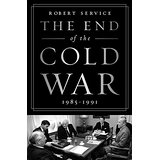Nothing is as simple as it first appears. That’s my frustration with history — so much gets left out of the textbooks.
I’ve just finished reading The End of the Cold War: 1985-1991 by Robert Service. It’s a very detailed, and heavily documented, account of the events leading up to the fall of the Berlin Wall, dissolution of the Warsaw Pact, and the breakup of the Soviet Union. The detail is probably too much for the casual reader and it’s a chore keeping track of all the Russian names. But it gives an appreciation for the vision of both Ronald Reagan and Mikhail Gorbachev, and the obstacles they faced, especially from within their own respective systems. (Let’s just say there were few people looking forward to the reunification of Germany.) It’s fascinating now to go back and relive that crucial part of history.
The final chapter is a Postscript that includes recent events. Does the rise of Vladimir Putin signal the beginning of another Cold War? Not really — “This was a bad turn in international relations. But there have always been some heavy constraints on Putin’s freedom of action….. Although the Russian leadership desires to scare and bully its neighbours, it has only a limited capacity to confront America — and it is to be hoped that the Kremlin elite has the sense to recognize this.”
the rise of Vladimir Putin signal the beginning of another Cold War? Not really — “This was a bad turn in international relations. But there have always been some heavy constraints on Putin’s freedom of action….. Although the Russian leadership desires to scare and bully its neighbours, it has only a limited capacity to confront America — and it is to be hoped that the Kremlin elite has the sense to recognize this.”
I think the author drew some important conclusions at the end —
“All of us living today owe a debt to the generation of leaders who ended the Cold War and made it less likely that their successors will go to thermonuclear war. Much was accomplished; more still urgently needs to be done.”
